Caspian, the Pevensies and the Narnians parade through the Telmarine capital as the populace cheer and throw flowers. OK, remember how I mentioned that cutting Aslan’, Bacchus and company restoring Beruna and other towns back to their natural, Narnian state had a negative impact on the story? This is it. Why would the Telmarines be cheering for the Narnians now? Given the world we’ve established, shouldn’t they view Glenstorm, Trumpkin, Reepicheep, etc. as dangerous freaks? Dangerous freaks that have risen seemingly out of nowhere and taken over their country? In the book, Dr. Cornelius tells Caspian that many of his fellow citizens secretly wish that their ancestors hadn’t destroyed the Old Narnians and in the end, we’re informed that “Some of (the Telmarines), chiefly the young ones, had, like Caspian, heard stories of the Old Days and were delighted that they had come back. They were already making friends with the creatures.” Idealistic, sure, but it works in the storybook context. Had the movie kept the scenes it cut from the book’s penultimate chapter, of some Telmarines fleeing from Aslan and the divine revelers while others happily join them, it would have been easier to communicate that some Telmarines would welcome a return to the Narnians’ golden age. As it is, I suppose it’s possible they’re cheering because they hate Miraz so much, but he’s been king for such a short time in this version that I doubt there’s any reason for them to consider him a tyrant. On the other hand, I really enjoy the scenes this movie has created showing him maneuvering his way onto the throne rather than having that all be in the past as in the book. See, this is why I decided to do a thirteen-part series on this adaptation instead of a couple of posts. It has so many issues of which I can see both sides. The best explanation for the peasants cheering for this victory parade, the best that I can come up with anyway, is that they’re frightened of what the new king will do to them if they don’t, and that cynical interpretation doesn’t fit in with the scene’s joyful atmosphere. It would work so much better if the movie had included those scenes from the book, some versions of them anyway. You may not like those scenes, but you’ve got to admit the story is incomplete without them.
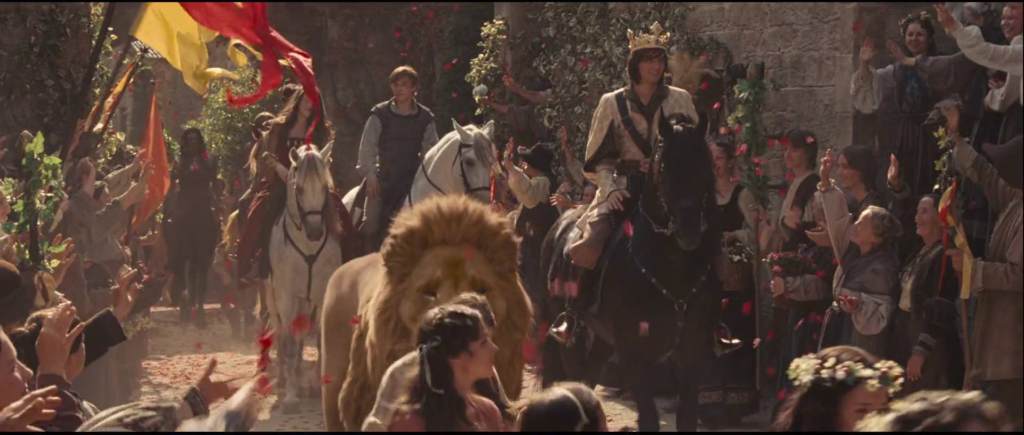
But don’t feel too bad for the conquered Telmarines. We’ll soon see they get a happy ending of sorts. We transition to the Telmarine castle at night, lit up by fireworks. The next morning, Caspian emerges from the castle and walks across the courtyard. A(n uncredited) passing maidservant bows her head, a good way to establish Caspian is king now without the bother of showing the coronation. He sees Aslan talking to Peter and Susan. They all look very serious, particularly her.

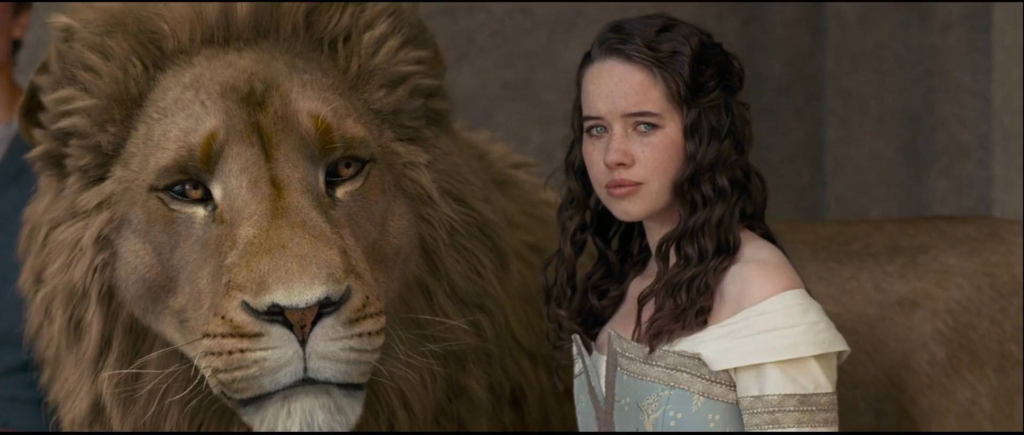
“We are ready,” says Caspian, “Everyone has assembled.” This assembly turns out to be at the edge of one of the majestic cliffs near the castle.
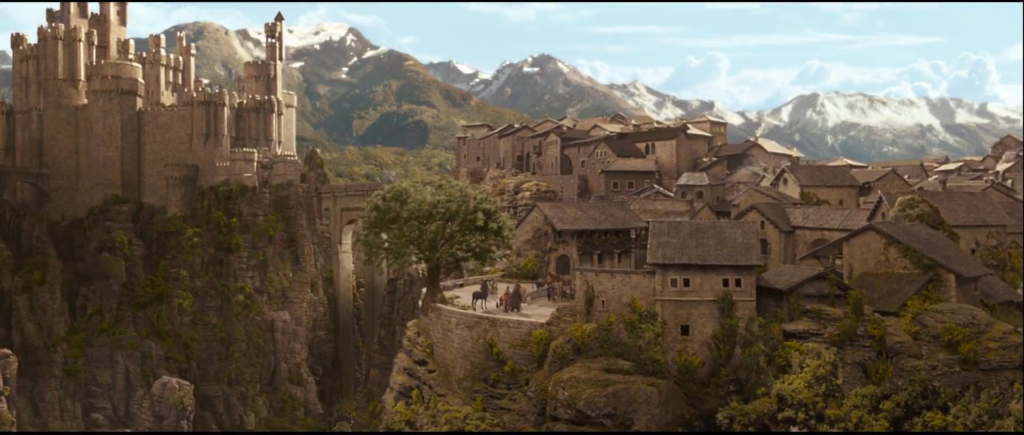
“Narnia belongs to the Narnians just as it does to Man,” Caspian proclaims. “Any Telmarines who want to stay and live in peace are welcome to. But for any of you who wish, Aslan will return you to the home of our forefathers.” In the book, Aslan is the one who gives the equivalent of this speech but I’m fine with Caspian giving this part. He has so little to do in the second half of the story. “It’s been generations since we left Telmar,” says a(n also uncredited) Telmarine in the crowd. The script, by the way, gives these characters more dignity than does the book in which they grumble, “We don’t remember Telmar. We don’t know where it is. We don’t know what it is like.” “We’re not referring to Telmar,” says Aslan. “Your ancestors were seafaring brigands, pirates run aground on an island. There they found a cave, a rare chasm that brought them here from their world, the same world as our kings and queens.” The Pevensies react to this. You’d think Aslan would have already mentioned to Peter and Susan that the Telmarines come from their world in the little offscreen talk he gave them but, hey, the book implies that they were surprised at this point too. Caspian, in the book, expresses regret here that he didn’t come “of a more honorable lineage.” Aslan replies, “You come of the Lord Adam and the Lady Eve. And that is both honour enough to erect the head of the poorest beggar, and shame enough to bow the shoulders of the greatest emperor on earth. Be content.” I’d have loved it if the movie could have included that. It’s a great quote and I’d have liked to have seen Ben Barnes act the moment. Still, there are a lot of great things from the scene in the book that are included by the movie’s version.
“It is to that island I can return you,” continues Aslan. “It is a good place for any who wish to make a new start.” The Telmarines murmur amongst themselves. Suddenly, a voice in the back says, “I will go.” To Caspian’s surprise, the voice belongs to General Glozelle. “I will accept the offer,” he says. There’s a brief silence as he steps forward. Then, to Caspian’s further surprise, Prunaprismia says, “So will we,” and follows Glozelle. “We” includes the baby she’s holding and Lord Scythley who stands beside her. (At first, I thought the two of them had hooked up after her husband’s death but according to online material, he’s actually supposed to be her father.)
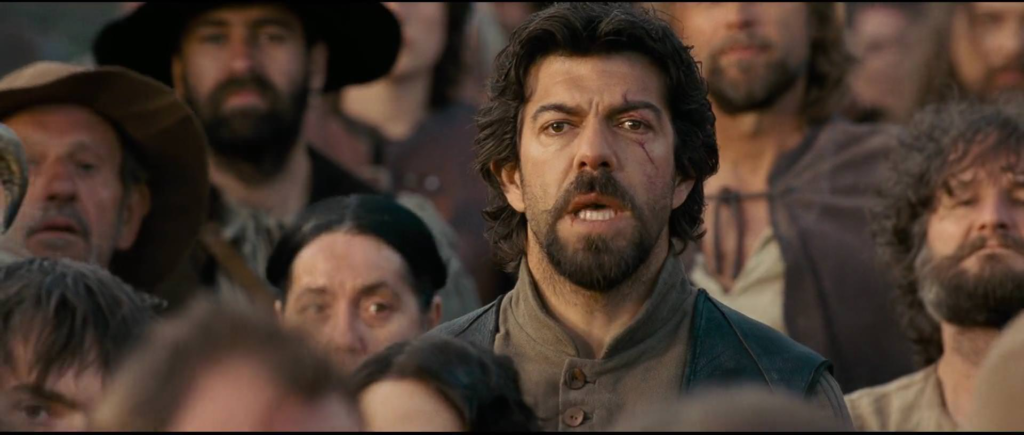
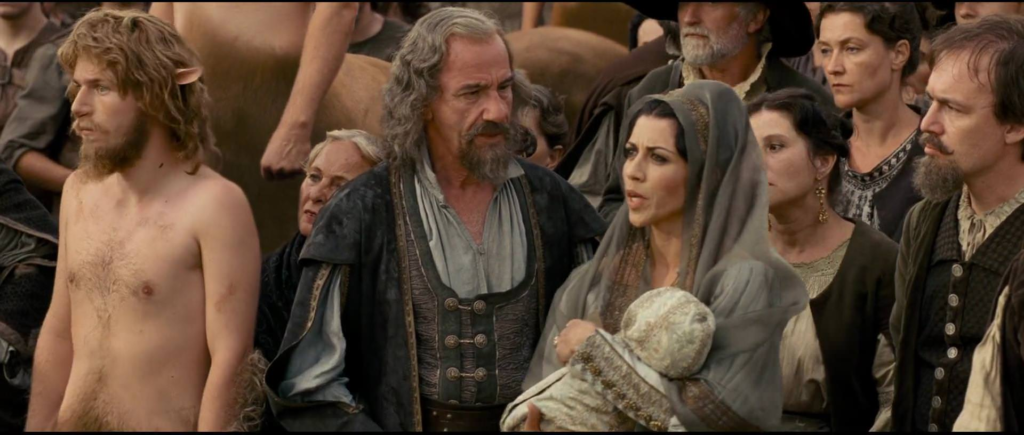
“Because you have spoken first,” says Aslan, “your future in that world shall be good.” Then he breathes on them, bestowing a blessing. Now, as I’ve written before, I’m against adaptations redeeming minor villains who weren’t redeemed in the source material but I’m willing to allow it here because otherwise the filmmakers would doubtless have cut this moment from the book and it’s an interesting one, being one of the few examples in The Chronicles of Narnia-almost the only example-of background antagonists showing decency and implying that they have a larger story about which we never learn. But if the first Telmarine to volunteer and receive the blessing had been a random guy we’d never seen before, as in the book, the randomness would likely have felt more confusing than intriguing.
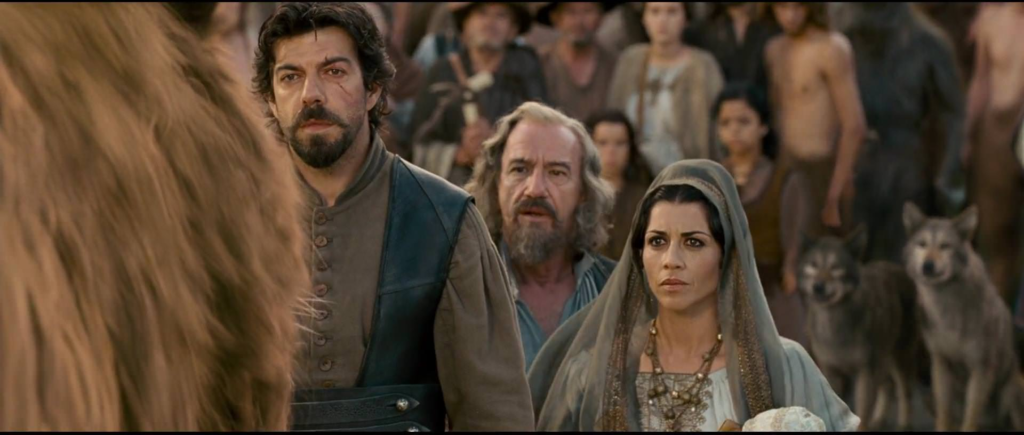
Aslan then turns to two gnarled old trees that have grown twisted around each other at the edge of the cliff. They magically separate at their bases, creating a doorway leading seemingly off the cliff. In the book, this scene takes place in a glade with no cliff in sight and the magic doorway is just made out of three pieces of wood. I think the Hollywood gloss works in this instance.
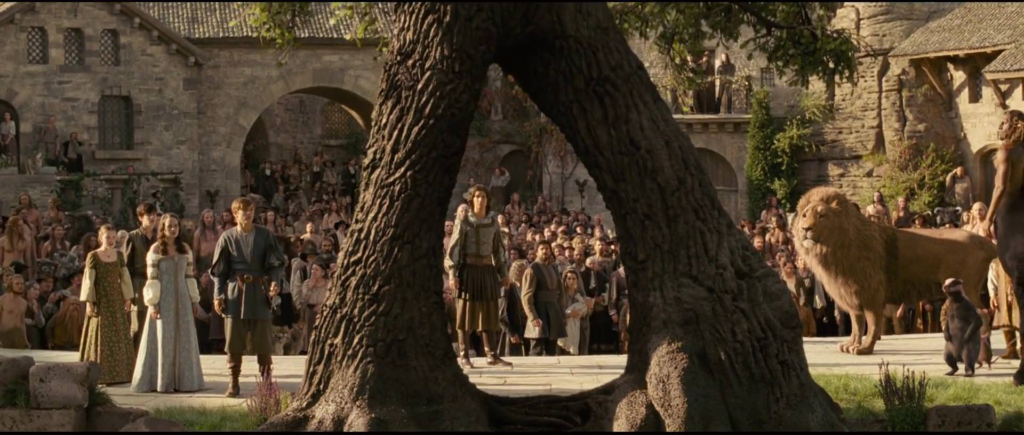
Glozelle, Prunaprismia and her family, looking, in the book’s words, “startled but not unhappy,” step through the door and vanish. The crowd understandably panics. “How do we know he is not leading us to our deaths?” yells one man (Marcus ‘O Donovan.) “Sire, if my example can be of any service,” Reepicheep says to Aslan, “I will take eleven mice through with no delay.” This sacrificial offer on the mouse’s part is happily not played for laughs. Peter and Susan look at each other. Aslan gives them a look too. “We’ll go,” says Peter solemnly. “We will?” Edmund asks in surprise. “Come on, time’s up,” says Peter, “After all, we’re not really needed here anymore.” With those words, he hands his sword to a shocked Caspian. It’s a nice moment of redemption.
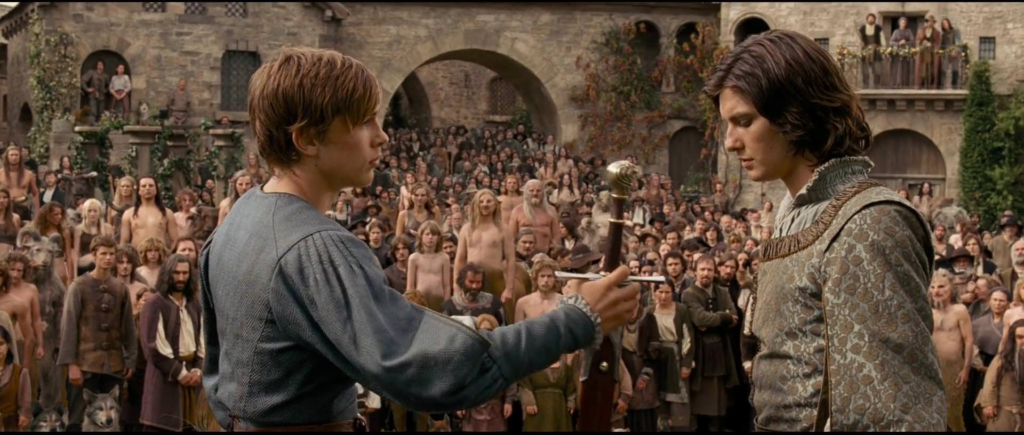
“I will look after it until you return,” says Caspian. “I’m afraid that’s just it,” Susan says gently. “We’re not coming back.” This is one of the scene’s quieter bombshells but it’s still a bombshell. “We’re not?” Lucy. “You two are,” Peter says, looking at her and Edmund. “At least I think he means you two,” he adds, turning to Aslan deferentially. Peter saying he thinks Aslan means Edmund and Lucy to return to Narnia rather than that he knows it is a good way of demonstrating he’s learned humility, and it comes from the book.[1]While Peter wasn’t as arrogant in the literary Prince Caspian, he did express incredulity in Lucy’s claims on the grounds that Aslan had never been invisible to them before. Arguably, … Continue reading “But why? Did they do something wrong?” Lucy asks Aslan. “Quite the opposite, Dear One,” says Aslan. “But all things have their time. Your brother and sister have learned what they can from this world. Now it’s time for them to live in their own.” I know I’ve described Liam Neeson’s vocal performance as not very interesting in the past, but I really do admire how he conveys with lines like those that Aslan is amused by Lucy without sounding annoyingly smug. It really does give the impression that he’s a supernatural being with knowledge no one else has. The animators also do a great job with the character’s facial expressions. Incidentally, the part about the Pevensies needing to learn from Narnia wasn’t mentioned in the book version of Prince Caspian, only in the next book, The Voyage of the Dawn Treader. It was probably a good idea to introduce the idea earlier because the idea that characters can grow too old for Narnia can be rather jarring to readers initially. Lucy still needs some comforting. Fortunately, Peter is ready to provide it. “It’s all right, Lu,” he says. “It’s not how I thought it would be. But it’s all right. One day you’ll see too. Come on.” That dialogue is quite close to that in the book. In fact, I almost think I like the way the movie phrases it better![2]For comparison, here’s the relevant quote. “It’s all rather different from what I thought. You’ll understand when it comes to your last time. But, quick, here are our … Continue reading I don’t remember saying that about anything in these scripts before!
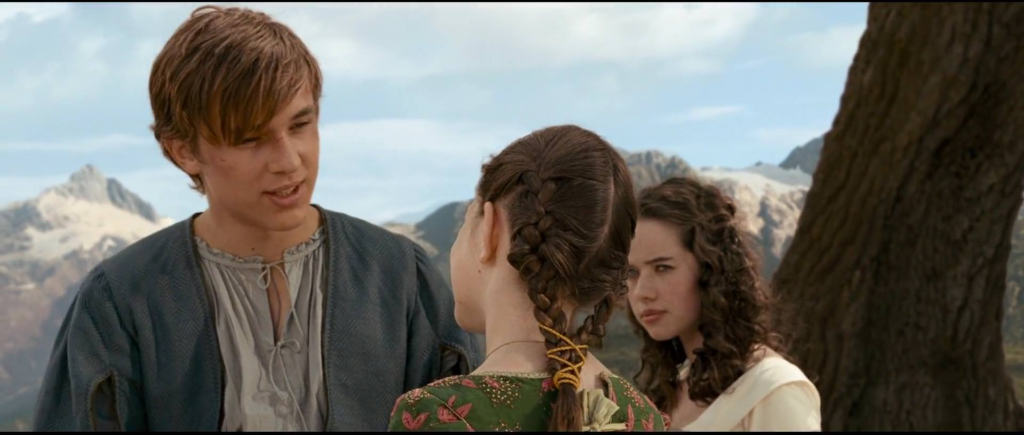
The Pevensies bid farewell to the friends they’ve made. After an initially formal bow, Lucy impulsively gives Trumpkin a big hug.
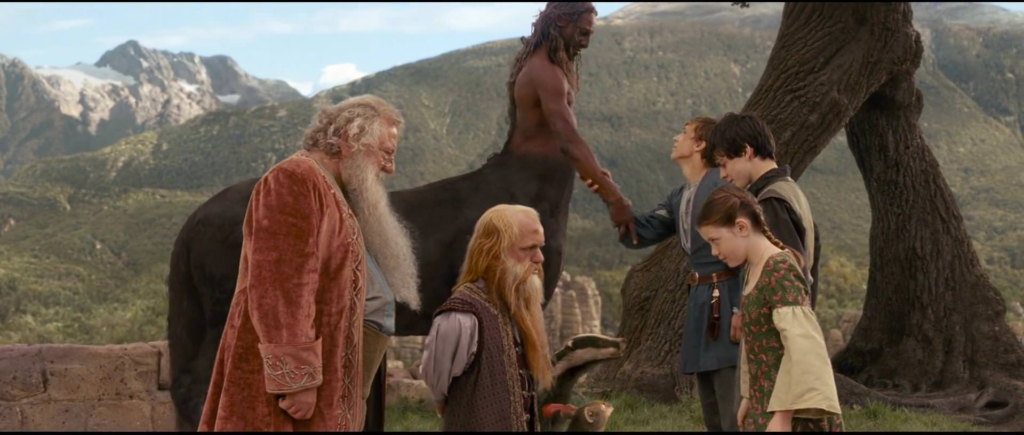
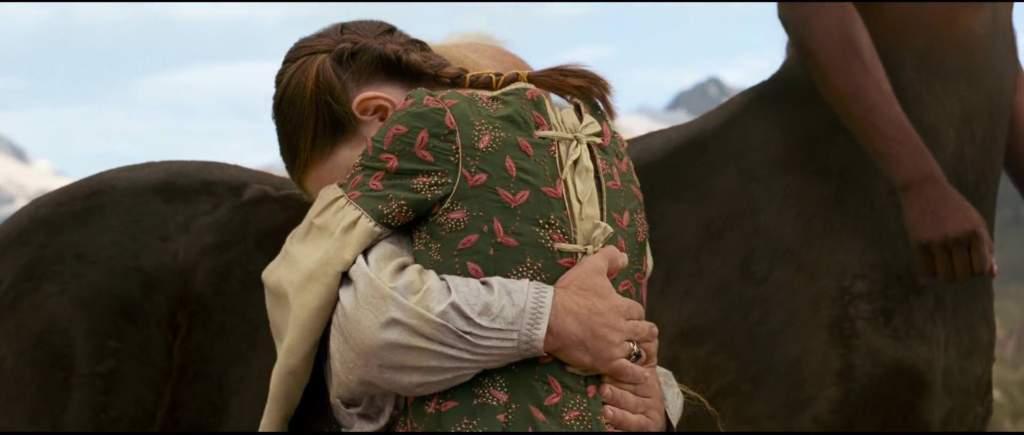
Then…Oh no! Susan and Caspian are talking.
Susan: I’m glad I came back.
Caspian: I wish we had more time together.
Susan: It would never have worked anyway.
Caspian: Why not?
Susan: I am thirteen hundred years older than you.
Initially, the whole romantic tension thing between these characters was treated as a humorous subtext and while I thought the idea of adding romance to the story was dumb, I could kind of tolerate it, even laugh at and enjoy it. Then as the relationship was treated more seriously, with Caspian disappointing Susan and having to redeem himself in her eyes, it started to bug me more. But it was still presented as a subtext. Now, all of a sudden, it’s supposed to be this big dramatic thing? Granted the conversation ends with a joke but lines like “I wish we had more time together” and “It would never have worked out anyway” make it unambiguous that the characters are thinking about a romantic relationship in a way none of their previous dialogue has. As a book fan, I want to just be able to ignore this and as a movie fan, I don’t feel like it’s earned. Couldn’t the scene have just relied on the actors’ performances to convey their romantic regrets without those lines making them explicit? By the way, the book had Caspian offer Susan her horn back at this point and her tell him he could keep it. That is the only interaction between them C. S. Lewis records. How do you do an adaptation where they’re a couple and not include that?
Susan starts to head to the door, then turns back and… now they’re kissing?! Argh! “I’m sure when I’m older, I’ll understand,” says Lucy in disgust. “I’m older and I don’t want to understand,” says Edmund. Peter just laughs. OK, now it’s really impossible for me to ignore this pointless added romance and, even if I liked the idea, I don’t feel Caspian and Susan have earned this big romantic moment. Couldn’t she have just kissed him on the cheek? Or given him a hug? How about a nice firm handshake? Actually, after they kiss, they also hug and I’m just going to show an image of that, not of the kiss. Because that’s how I prefer to remember the scene.
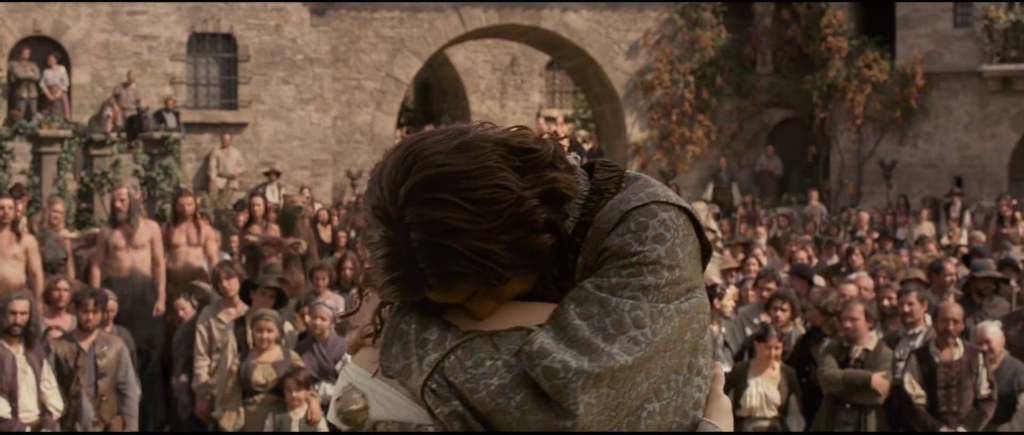
Our first end credits song, The Call by Regina Spektor starts. On my first viewing, this jarred me. You may remember I didn’t mind having pop songs play over the end credits of a Narnia movie but couldn’t accept the idea of them in the movies’ bodies. However, repeated exposure, has made me appreciate this instance of that. The Call is a very pleasant song that really does fit with the atmosphere of the ending. I think when I first saw it, I was too unsettled by the kiss to notice how nicely Harry Gregson-Williams’s score was transitioning into the song. I was also jarred because the first lyric is “It started out as a feeling” and for one terrible moment, I thought there was going to be an entire credits song devoted to Susan and Caspian. Even if you find their romance cute, you can’t seriously believe it deserves that. Fortunately, the feeling the song describes turns out to be the Narnians’ wish for their kings and queens to return to them and vice versa.[3]I think that’s what the song is about anyway. It’s a pleasant song, not a great one.
The Pevensies take one last look at Narnia and their friends before turning to go.
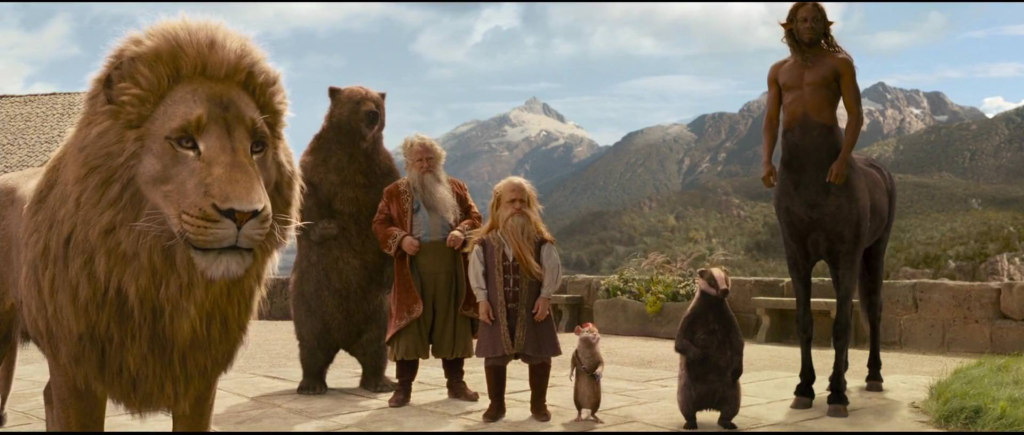
Lucy takes a second last look at Aslan specifically. He gives her a reassuring nod. Lucy looks like she might cry.
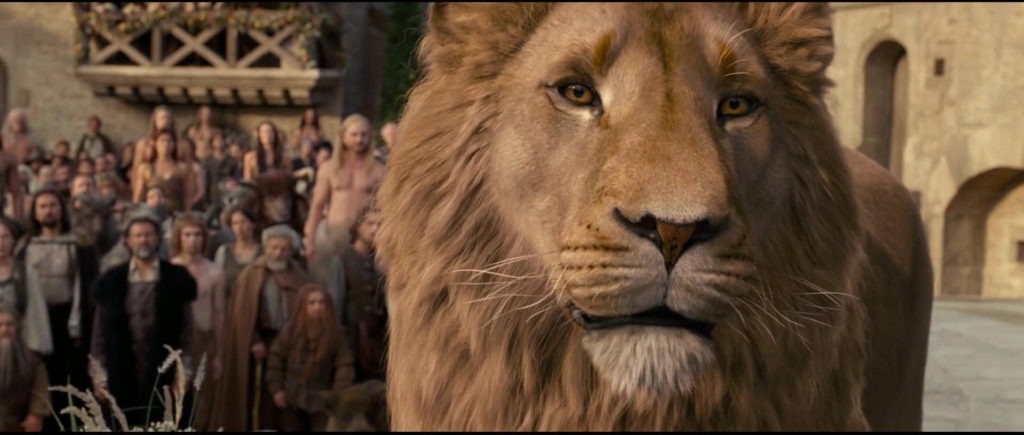
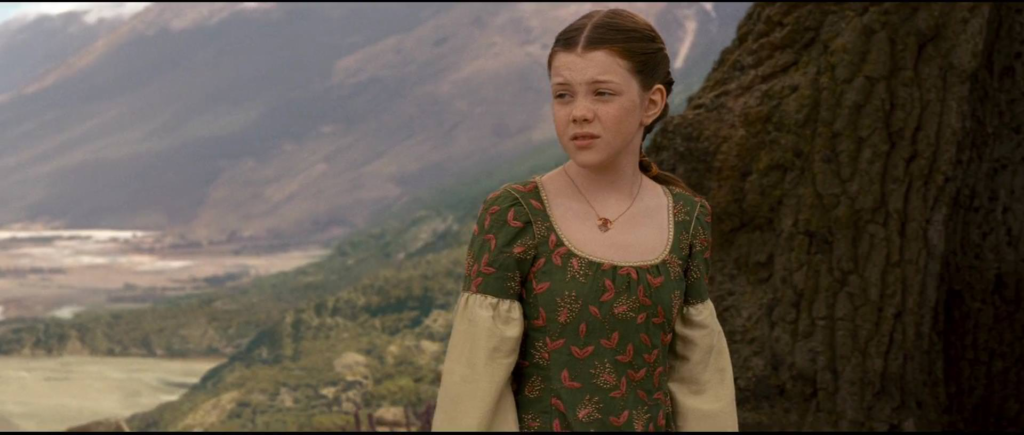
The Pevensies step through the door and are back at the train station in England and are wearing their school uniforms. In the book, they had to change out of them before going back. The Lion, the Witch and the Wardrobe is actually the only Narnia book in which the characters clothes magically change when they return to their own world, understandably so since those characters were adults reverting back to being children. I don’t mind the movie making that change. Showing them changing their outfits before leaving would be cumbersome and the transition is really smooth. While the movie’s railway may be underground and urban rather than outdoor and rural like the book’s, watching this scene, my feelings about it are the same as those of the characters C. S. Lewis described. It’s “a little flat and dreary for a moment after all they had been through, but also, unexpectedly, nice in its own way.”
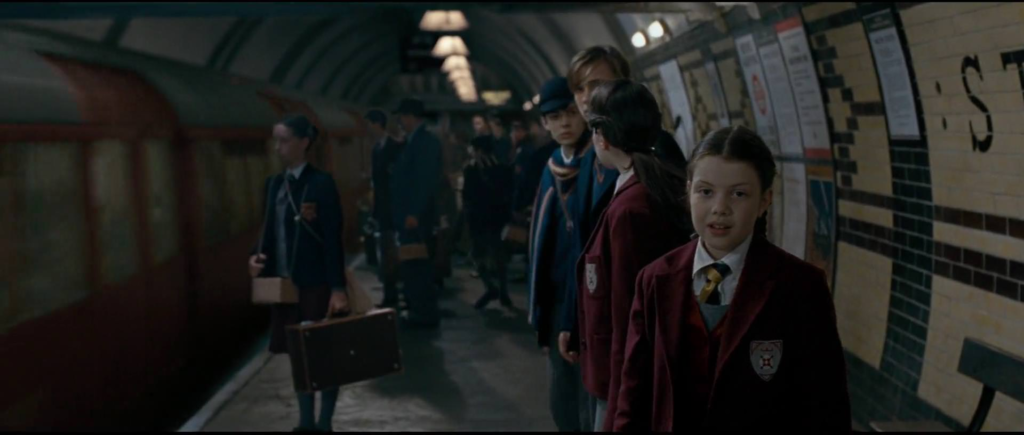
The Pevensies are seemingly too overwhelmed to think of boarding their train. The geeky boy Susan rejected[4]Not Caspian, the other one. does so. “Aren’t you coming, Phyllis?” he calls hopefully. Poor sap! The Pevensies scramble to get their luggage. As they all climb aboard, Edmund looks preoccupied with something. “You don’t think there’s any way we could get back?” he asks. “I’ve left my new torch in Narnia.” The others laugh. Geeky Boy is standing within earshot of them and I like to imagine he’s baffled as to why their laughing about someone leaving their new torch in an ancient hillside commune in central Italy.
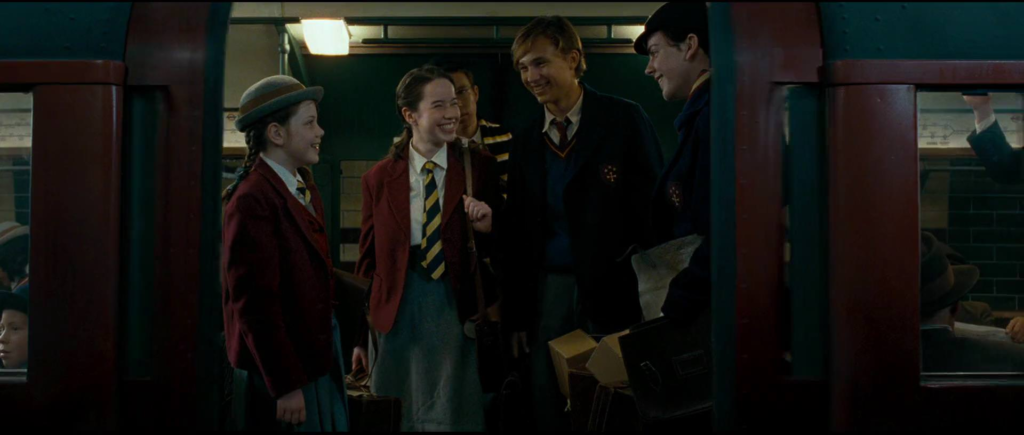
“I’ve left my new torch in Narnia” is also the last line of the book, it being the tendency of the Narnia books to end with humorous lines, and I love the movie for keeping it. As the train disappears down the tunnel, we hear Aslan’s triumphant roar. If you can ignore the kiss, which, of course, you can’t, this is a beautiful ending that captures the bittersweet complexities of the equivalent scene in the book.[5]Incidentally, for some reason, two versions of one of the end credits songs, This Is Home by Switchfoot, were made, one for the credits and one for the soundtrack. I have no idea why. This seems like … Continue reading
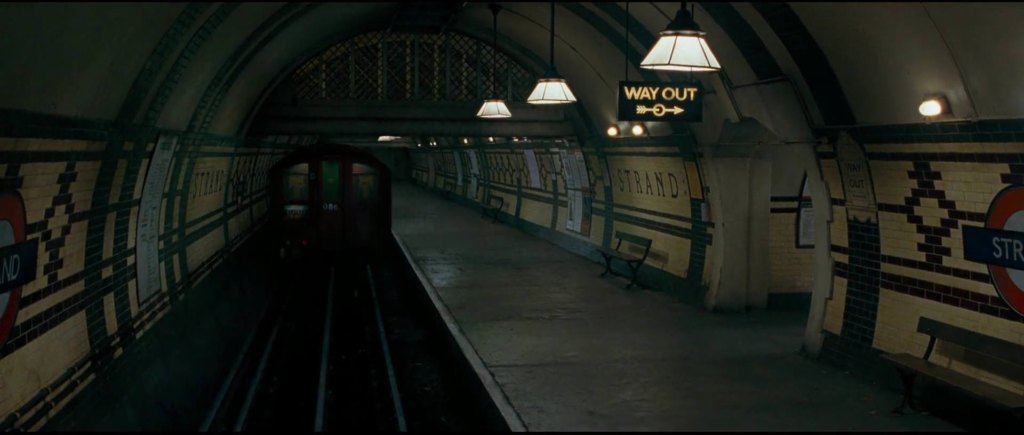
Concluding Thoughts
Throughout my education, I always hated having to do concluding paragraphs for my essays. Why should I waste ink summarizing what I just wrote? Did my teachers and professors really have such bad memories? But now that I have my own blog where I can write however I desire, I find myself feeling the need to write some conclusion for this series on Prince Caspian (2008) that will basically repeat several points I’ve made in previous posts. If I don’t, it’ll just feel incomplete. Oh well. Hopefully, my readers have forgotten most of my points by now.
The public seems split over whether this movie or The Lion, the Witch and the Wardrobe (2005) is superior. If you’ll pardon the generalization, critics seem to prefer the former and fans of the books seem to prefer the latter. I consider them equal on the whole. Prince Caspian has more problems with characterizations and lacks the childlike sense of awe and wonder I found so breathtaking in The Lion, the Witch and the Wardrobe. But on the other hand, with The Lion, the Witch and the Wardrobe, the generically Hollywood banter and quips as well as the action scenes are things I endure more than I enjoy. I don’t hate them all or anything but they’re really not the parts of the movie I consider great. With Prince Caspian, I get a kick out of the jokes and the action scenes, generically Hollywood though they may be, for their own sake. I know I wrote that the final battle drags for me but that’s the exception rather than the rule and the ending with the trees and the river god makes up for it.[6]Upon reflection, I think the reason I prefer the scene of the Narnians infiltrating the Telmarine castle to the battle is that I enjoy seeing the details of how they do so and when things start to go … Continue reading And, of course, there are many virtues both the first two Narnia movies share like great casting and beautiful visuals. (It was surprisingly hard choosing images to include in this series since so many shots caught my eye.) Sure, the reimagined story for Prince Caspian may be a bit of a mess but it’s my mess!
While I don’t agree with those who say this movie is an improvement on the book’s story as a whole, I do agree that it improves on it in parts, which is rare for me to say about a Narnia adaptation. I actually feel that combining the movie’s story and that of the book would be ideal or would make the most compelling version of Caspian’s character anyway. If he were a High King Peter fanboy since childhood, as in the book, and then became disgusted by his actions, as in the movie, and realized in the end that the kings and queens of old aren’t perfect but they’re still heroes, meaning that his imperfect self could be a hero too, wouldn’t that be more interesting than his arc in either the book or the movie? Of course, I know many fans aren’t going to like any version with the movie’s assassination of Peter’s character. All I can say is that I respect their viewpoint though it isn’t mine.
I feel like I’m supposed to describe this Prince Caspian as “a bad adaptation but a great movie.” But I’m disinclined to do so. For one thing, the movie has artistic problems of its own, such as unclear exposition, which hewing closer to the source material could very well have fixed. For another…while I can’t, in good conscience, call this a good adaptation of the book, I really can’t call it a bad one either.[7]It’s rather like the 2019 David Copperfield movie in that respect. There are so many fun little things from the book it includes, like the argument about girls and maps and somebody threatening to sit on Nikabrik’s head. I know it sounds ridiculous to praise those in light of the massive artistic license this adaptation takes, but what can I say? That’s how I feel. The last scene is a great little microcosm of the whole thing. It has the kiss, a huge thing that’s not true to the book and irritates me, surrounded by beautiful stuff that’s from the book like Aslan blessing the first Telmarine to trust him and Reepicheep offering to go through the door to prove Aslan’s trustworthiness. I admit I don’t feel as inclined to randomly revisit this Narnia movie as I do the first one. But after I rewatch that first one, then I always want to rewatch this one and I don’t notice any particular quality gap between them when I do. Hey, what do you know? That exactly describes my relationships to the two books that inspired them.
References
| ↑1 | While Peter wasn’t as arrogant in the literary Prince Caspian, he did express incredulity in Lucy’s claims on the grounds that Aslan had never been invisible to them before. Arguably, even in the book, his story was about learning that the Lion wasn’t tame. |
|---|---|
| ↑2 | For comparison, here’s the relevant quote. “It’s all rather different from what I thought. You’ll understand when it comes to your last time. But, quick, here are our things.” |
| ↑3 | I think that’s what the song is about anyway. It’s a pleasant song, not a great one. |
| ↑4 | Not Caspian, the other one. |
| ↑5 | Incidentally, for some reason, two versions of one of the end credits songs, This Is Home by Switchfoot, were made, one for the credits and one for the soundtrack. I have no idea why. This seems like a pointless expense. Anyway, of the two, the soundtrack version is superior. While it has some cheesy lyrics (“We are miracles and we’re not alone”), it also does a better job of communicating some of the book’s themes than the movie itself does. |
| ↑6 | Upon reflection, I think the reason I prefer the scene of the Narnians infiltrating the Telmarine castle to the battle is that I enjoy seeing the details of how they do so and when things start to go wrong, like Caspian not being at the gatehouse and Edmund losing his torch, I wonder what will happen. With the battle, the only question is which characters will die and I already know that. |
| ↑7 | It’s rather like the 2019 David Copperfield movie in that respect. |
